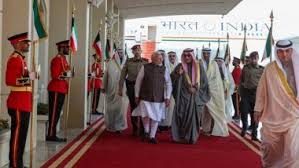
India Issues Strong Warning to Pakistan Over Shehbaz Sharif's UN Speech
New Delhi: Following Shehbaz SharifΓÇÖs speech at the United Nations General Assembly (UNGA), India has issued a stern warning to Pakistan. India strongly condemned PakistanΓÇÖs continued support for cross-border terrorism, asserting that Pakistan will inevitably face consequences for its actions. ItΓÇÖs worth noting that during his speech, Pakistan's Prime Minister raised the issue of Jammu and Kashmir and called for the reversal of the decision to revoke Article 370. India expressed strong objections to these remarks.
IndiaΓÇÖs First Secretary at the UN, Bhavika Manglanandan, accused Pakistan of being complicit in global terrorism, stating that Pakistan has long supported cross-border terrorism. She highlighted PakistanΓÇÖs long history of backing terrorists. ManglanandanΓÇÖs response came in light of SharifΓÇÖs call for the reversal of India's 2019 decision to revoke Article 370, which had previously granted special status to Jammu and Kashmir.
Manglanandan further remarked that the UNGA witnessed an unfortunate event that morning, where a nation led by its military, notorious for terrorism, narcotics trade, and international crime, dared to attack the worldΓÇÖs largest democracy. The world can now clearly see Pakistan for what it truly is.
She criticized SharifΓÇÖs speech as audacious, noting that Pakistan, a country governed by its military with a global reputation for terrorism, had the temerity to attack India, the worldΓÇÖs largest democracy. She also referenced terror attacks carried out by Pakistan-based groups, including the 2001 Indian Parliament attack and the 2008 Mumbai attacks.
This is not the first time India has confronted Pakistan over terrorism at the UN. A few years ago, External Affairs Minister S. Jaishankar also described Pakistan as a sympathizer of terrorists. During a session at the United Nations Security Council (UNSC), Jaishankar pointed out that Pakistan-based terrorist organizations such as Lashkar-e-Taiba and Jaish-e-Mohammed continue to operate fearlessly and are even encouraged. He also recalled terrorist attacks carried out by Pakistan-based militants, including the 2008 Mumbai attacks, the Pathankot airbase attack, and the Pulwama attack, urging the international community to never provide safe havens for terrorists.
While addressing a high-level UNSC meeting on the threat posed by terrorist acts to international peace and security, Jaishankar stressed that the increasing activities of the banned Haqqani network justify these growing concerns. He further highlighted the rise of ISIS-Khorasan (ISIS-K) in the region, warning that the situation in Afghanistan has heightened regional and international security concerns.
New Delhi: Following Shehbaz SharifΓÇÖs speech at the United Nations General Assembly (UNGA), India has issued a stern warning to Pakistan. India strongly condemned PakistanΓÇÖs continued support for cross-border terrorism, asserting that Pakistan will inevitably face consequences for its actions. ItΓÇÖs worth noting that during his speech, Pakistan's Prime Minister raised the issue of Jammu and Kashmir and called for the reversal of the decision to revoke Article 370. India expressed strong objections to these remarks.
IndiaΓÇÖs First Secretary at the UN, Bhavika Manglanandan, accused Pakistan of being complicit in global terrorism, stating that Pakistan has long supported cross-border terrorism. She highlighted PakistanΓÇÖs long history of backing terrorists. ManglanandanΓÇÖs response came in light of SharifΓÇÖs call for the reversal of India's 2019 decision to revoke Article 370, which had previously granted special status to Jammu and Kashmir.
Manglanandan further remarked that the UNGA witnessed an unfortunate event that morning, where a nation led by its military, notorious for terrorism, narcotics trade, and international crime, dared to attack the worldΓÇÖs largest democracy. The world can now clearly see Pakistan for what it truly is.
She criticized SharifΓÇÖs speech as audacious, noting that Pakistan, a country governed by its military with a global reputation for terrorism, had the temerity to attack India, the worldΓÇÖs largest democracy. She also referenced terror attacks carried out by Pakistan-based groups, including the 2001 Indian Parliament attack and the 2008 Mumbai attacks.
This is not the first time India has confronted Pakistan over terrorism at the UN. A few years ago, External Affairs Minister S. Jaishankar also described Pakistan as a sympathizer of terrorists. During a session at the United Nations Security Council (UNSC), Jaishankar pointed out that Pakistan-based terrorist organizations such as Lashkar-e-Taiba and Jaish-e-Mohammed continue to operate fearlessly and are even encouraged. He also recalled terrorist attacks carried out by Pakistan-based militants, including the 2008 Mumbai attacks, the Pathankot airbase attack, and the Pulwama attack, urging the international community to never provide safe havens for terrorists.
While addressing a high-level UNSC meeting on the threat posed by terrorist acts to international peace and security, Jaishankar stressed that the increasing activities of the banned Haqqani network justify these growing concerns. He further highlighted the rise of ISIS-Khorasan (ISIS-K) in the region, warning that the situation in Afghanistan has heightened regional and international security concerns.
IndiaΓÇÖs First Secretary at the UN, Bhavika Manglanandan, accused Pakistan of being complicit in global terrorism, stating that Pakistan has long supported cross-border terrorism. She highlighted PakistanΓÇÖs long history of backing terrorists. ManglanandanΓÇÖs response came in light of SharifΓÇÖs call for the reversal of India's 2019 decision to revoke Article 370, which had previously granted special status to Jammu and Kashmir.
Manglanandan further remarked that the UNGA witnessed an unfortunate event that morning, where a nation led by its military, notorious for terrorism, narcotics trade, and international crime, dared to attack the worldΓÇÖs largest democracy. The world can now clearly see Pakistan for what it truly is.
She criticized SharifΓÇÖs speech as audacious, noting that Pakistan, a country governed by its military with a global reputation for terrorism, had the temerity to attack India, the worldΓÇÖs largest democracy. She also referenced terror attacks carried out by Pakistan-based groups, including the 2001 Indian Parliament attack and the 2008 Mumbai attacks.
This is not the first time India has confronted Pakistan over terrorism at the UN. A few years ago, External Affairs Minister S. Jaishankar also described Pakistan as a sympathizer of terrorists. During a session at the United Nations Security Council (UNSC), Jaishankar pointed out that Pakistan-based terrorist organizations such as Lashkar-e-Taiba and Jaish-e-Mohammed continue to operate fearlessly and are even encouraged. He also recalled terrorist attacks carried out by Pakistan-based militants, including the 2008 Mumbai attacks, the Pathankot airbase attack, and the Pulwama attack, urging the international community to never provide safe havens for terrorists.
While addressing a high-level UNSC meeting on the threat posed by terrorist acts to international peace and security, Jaishankar stressed that the increasing activities of the banned Haqqani network justify these growing concerns. He further highlighted the rise of ISIS-Khorasan (ISIS-K) in the region, warning that the situation in Afghanistan has heightened regional and international security concerns.

.jpg)
















